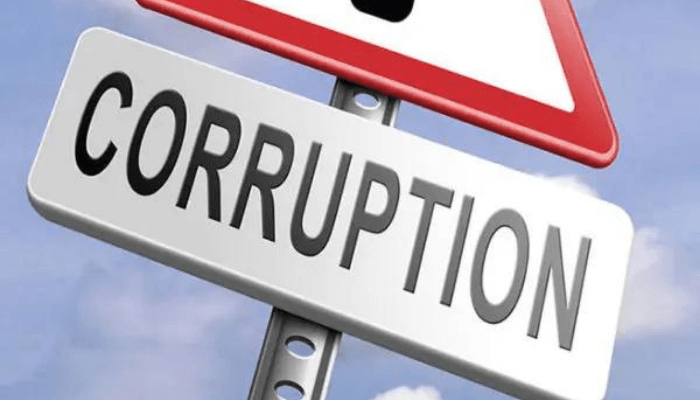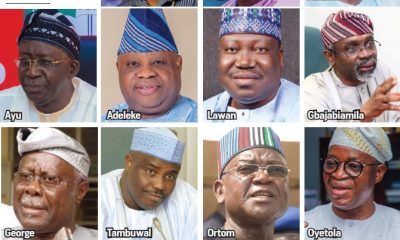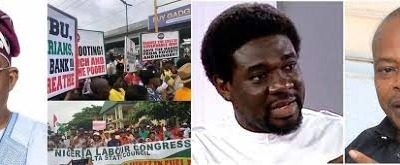OPINION
‘Even If Politicians Must Steal, Can’t They Steal A Little?’

BY ISAAC ASABOR*
Corruption has become so entrenched in Nigerian politics that it is almost accepted as the norm. Despite numerous attempts to eradicate this cancerous culture, it persists with a tenacity that confounds even the most optimistic observers. The establishment of institutions such as the Independent Corrupt Practices Commission (ICPC) and its counterpart, the Economic and Financial Crimes Commission (EFCC), was hailed as a sign of hope in the fight against corruption. However, despite the best intentions and efforts, the rot persists.
The irony is not lost on the average Nigerian, who has seen anti-corruption slogans come and go, hoping that this time will be different. However, with each passing administration, hope fades as the reality of unchecked looting and impunity becomes apparent. In this context, an elderly man, disillusioned by the ongoing theft of public funds, asked a question that encapsulated many people’s frustration: “Even if politicians want to steal, can not they steal a little?”
In Nigeria, corruption is more than just a few bad apples spoiling the bunch. It is a systemic issue that affects all levels of government, from the highest offices to the smallest local councils. The scale of this problem is staggering. Transparency International consistently ranks Nigeria as one of the most corrupt countries in the world, with billions of dollars lost to graft each year. These funds could have been used to construct hospitals, schools, roadways, and other critical infrastructure. Instead, they enrich the pockets of a select few.
The sheer audacity of some public officials is difficult to fathom. Stories of stolen funds stashed away in foreign bank accounts, luxurious properties owned by civil servants earning modest salaries, and unexplained wealth suddenly appearing in politicians’ hands are all too common. The elderly man referred to this level of corruption when he asked why, if politicians had to steal, they could not at least show restraint.
Without sounding exaggerated, Nigeria’s corruption culture has far-reaching consequences that extend beyond financial loss. It has resulted in a breakdown in public trust, with citizens increasingly seeing their leaders as self-serving and disconnected from the realities of everyday life. This erosion of trust has resulted in a climate of cynicism, in which the public no longer believes change is possible. This cynicism is dangerous because it fosters apathy and disengagement from the political process, reinforcing the status quo.
Furthermore, corruption fuels poverty and inequality. When funds intended for public services are diverted by corrupt officials, the most vulnerable members of society bear the brunt of the consequences. Basic services such as healthcare, education, and clean water have become inaccessible, trapping millions of Nigerians in a cycle of poverty. The elderly man’s lament reflects widespread dissatisfaction with a system that not only tolerates but appears to reward corruption.
It should be noted that the ICPC and EFCC were formed with the noble goal of combating corruption and holding public officials accountable. While these organisations have made some progress, they have frequently been stymied by a lack of political will, insufficient resources, and interference from powerful individuals. The question of whether these agencies were effective is complex. On the one hand, they have successfully prosecuted several high-profile cases, sending a strong message that corruption will not be tolerated. On the other hand, the persistence of corruption at all levels of government indicates that much more work remains to be done.
One of the most significant challenges that Nigerian anti-corruption agencies face is the selective nature of their prosecutions. Critics claim that the agencies frequently target political opponents or lower-level officials while allowing well-connected individuals to avoid prosecution. This has created the perception that the fight against corruption is more about settling political scores than truly cleaning up the system. Until this perception is addressed, public trust in these institutions will be low.
From a cultural standpoint, corruption in Nigeria can be viewed as a symptom of larger societal problems. In many cases, corruption stems from a sense of entitlement and a desire to retain status and power. The elderly man’s question demonstrates a cultural acceptance of corruption as a fact of life, with an emphasis on limiting its excesses rather than eliminating it. This acceptance is reinforced by social norms that celebrate wealth regardless of how it was obtained, as well as a lack of strong ethical standards in public affairs.
There is also a cultural dimension to how corruption is justified. Many public officials justify their actions by citing the need to provide for members of their extended families, who frequently rely on them for financial assistance. This perpetuates a cycle in which corruption is not only tolerated but expected as a means of survival. Breaking the cycle necessitates a fundamental shift in societal values, prioritising integrity and accountability over wealth and power.
The media and civil society organisations play critical roles in the fight against corruption. Investigative journalism has helped expose corrupt practices and hold public officials accountable. However, journalists and activists frequently face serious threats, such as harassment, intimidation, and violence. Despite these challenges, the media has continued to shine a light on the dark corners of Nigerian politics, ensuring that corruption is not overlooked.
Civil society organisations have also taken the lead in advocating for stronger anti-corruption measures. These organisations work to raise public awareness about the dangers of corruption, advocate for legislative reforms, and monitor the implementation of anti-corruption initiatives. Their efforts have helped to keep corruption on the national agenda, even when political leaders would rather ignore it.
Addressing Nigeria’s corruption culture requires a multifaceted approach. Strengthening the capacity and independence of anti-corruption agencies is necessary, but it is insufficient. There must be a concerted effort to promote ethical leadership and instil a sense of accountability in public officials. This could be accomplished through a combination of stricter enforcement of anti-corruption laws, public education campaigns, and increased transparency and accountability in the government.
Furthermore, there must be a shift in societal values. The worship of wealth, regardless of its origin, must be replaced by a culture that values integrity, honesty, and service to others. This is a difficult task, but it is necessary if Nigeria is to break free from the grip of corruption.
The elderly man asks, “Even if they want to steal, can not they steal a little?” is a powerful reminder of the frustration and despair that many Nigerians experience. It reflects the deep cynicism that has taken hold in a society where corruption appears unstoppable. However, it is also a call to action; a plea for moderation, sanity, and a future in which public officials are held accountable for their decisions.
Stealing, whether in small or large amounts, is still theft. However, until Nigeria addresses the root causes of its corruption culture, the elderly man’s question will continue to ring true, echoing the frustrations of a nation tired of a system that appears incapable of change. The time has come for Nigerians to demand more from their leaders, to hold them to a higher standard, and to reject the notion that corruption is an unavoidable part of politics. Only then can the country begin to heal from the scars left by decades of unchecked greed and impunity.
-
CRIME4 years ago
PSC Dismisses DCP Abba Kyari, To Be Prosecuted Over Alleged $1.1m Fraud
-
FEATURED4 years ago
2022 Will Brighten Possibility Of Osinbajo Presidency, Says TPP
-
FEATURED2 years ago
Buhari’s Ministers, CEOs Should Be Held Accountable Along With Emefiele, Says Timi Frank
-
BUSINESS & ECONOMY2 years ago
Oyedemi Reigns As 2023’s Real Estate Humanitarian Of The Year
-
SPORTS2 years ago
BREAKING: Jürgen Klopp Quits Liverpool As Manager At End Of Season
-
SPORTS2 years ago
Could Liverpool Afford Kylian Mbappe For €200 million? Wages, Transfer Fee
-
ENTERTAINMENT2 years ago
Veteran Nigerian Musician, Basil Akalonu Dies At 72
-
FEATURED2 years ago
Tribunal Judgement: Peter Obi Warns Of Vanishing Electoral Jurisprudence, Heads To Supreme Court
-
BUSINESS & ECONOMY2 years ago
Oyedemi Bags ‘Next Bulls Award’ As BusinessDay Celebrates Top 25 CEOs/ Business Leaders
-
FEATURED4 years ago
2023 Presidency: South East PDP Aspirants Unite, Demand Party Ticket For Zone

































